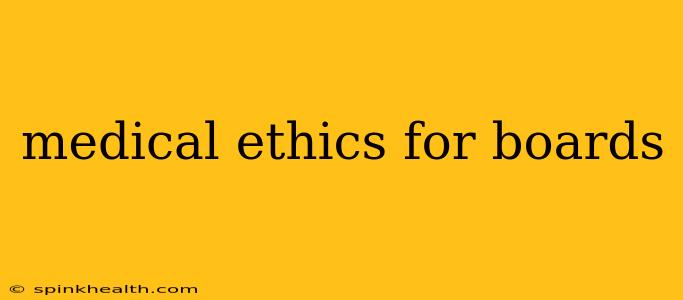The hushed tones of a boardroom meeting often mask the weight of decisions that profoundly impact lives. For healthcare boards, this weight is amplified tenfold. Medical ethics isn't just a checklist; it's the very foundation upon which trust, patient care, and the organization's reputation are built. This isn't just about avoiding lawsuits; it's about upholding the sacred trust placed in your institution. Let's explore the intricate landscape of medical ethics for boards, navigating the complexities and ensuring ethical excellence guides every decision.
What are the Key Ethical Considerations for Healthcare Boards?
This isn't a simple question with a simple answer. The ethical dilemmas facing healthcare boards are multifaceted, weaving together legal compliance, patient welfare, financial responsibility, and the very essence of what it means to provide compassionate care. Imagine this: your hospital faces a budget crunch. Do you cut corners on essential services, potentially jeopardizing patient safety? Or do you find other solutions, even if it means sacrificing some aspects of the institution’s growth? This is the kind of moral tightrope walk healthcare boards regularly face. The key ethical considerations revolve around:
- Patient safety and well-being: This is paramount. Every decision should prioritize the safety and well-being of patients, from ensuring high-quality care to protecting patient data privacy.
- Financial responsibility and resource allocation: Striking a balance between fiscal responsibility and ethical care delivery is crucial. Decisions about resource allocation must consider both the financial health of the organization and the needs of patients.
- Conflicts of interest: Transparency and the avoidance of conflicts of interest are paramount. Board members must declare any potential conflicts and recuse themselves from relevant decisions.
- Organizational integrity and transparency: Maintaining ethical standards within the organization fosters trust and accountability. This includes establishing clear ethical guidelines, ensuring compliance, and fostering a culture of open communication.
- Respect for patient autonomy: Patient rights must be respected, including their right to informed consent, refusal of treatment, and access to their own medical records.
- Fairness and equity in access to care: Healthcare boards have a responsibility to ensure equitable access to high-quality care for all patients, regardless of their background or socioeconomic status.
What are the Common Ethical Dilemmas Faced by Healthcare Boards?
The real-world challenges often go beyond theoretical discussions. Let's delve into some common ethical dilemmas:
Balancing Cost-Effectiveness with Quality of Care:
This is perhaps the most frequently encountered dilemma. How do you ensure high-quality care while managing costs effectively? Cutting corners can compromise patient safety, while excessive spending can jeopardize the financial stability of the institution. Finding the optimal balance demands careful consideration, transparent decision-making, and a commitment to ethical resource allocation.
Informed Consent and Patient Autonomy:
Ensuring patients truly understand their treatment options and have the capacity to make informed decisions is crucial. This involves clear communication, addressing patient concerns, and respecting their right to refuse treatment, even if it's against medical advice. Navigating this requires careful consideration of the patient’s cognitive abilities and emotional state.
End-of-Life Care and Advance Directives:
Decisions concerning end-of-life care can be emotionally charged, both for patients and their families. Respecting patient wishes as expressed in advance directives is essential, alongside providing compassionate care and support during this challenging time. This necessitates thorough understanding and application of relevant legislation and ethical guidelines.
Data Privacy and Confidentiality:
Protecting patient data is not merely a legal requirement; it's an ethical imperative. Healthcare boards must ensure robust systems are in place to protect sensitive information from unauthorized access and misuse. This requires staying abreast of evolving data protection laws and implementing effective security measures.
Whistleblowing and Transparency:
Creating a culture that encourages reporting of unethical behavior is vital. Healthcare boards must establish clear mechanisms for whistleblowers to report concerns without fear of retaliation, while simultaneously ensuring that all allegations are investigated thoroughly and impartially.
How Can Boards Effectively Address Ethical Issues?
Successfully navigating these complexities demands a proactive and multifaceted approach:
- Establish a robust code of ethics: A well-defined code of ethics provides a clear framework for decision-making and guides the behavior of board members and staff.
- Develop an ethics committee: An independent ethics committee can offer guidance on complex ethical dilemmas, provide objective advice, and ensure accountability.
- Provide regular ethics training: Regular training for board members and staff enhances awareness of ethical issues and improves decision-making capabilities.
- Foster open communication: Creating a culture of open communication encourages the reporting of ethical concerns and promotes transparency.
- Conduct regular ethical reviews: Periodic reviews of policies and practices ensure the organization's ethical standards remain current and effective.
The world of medical ethics for boards is complex, demanding, and endlessly fascinating. It is a constant evolution, reflecting societal changes and advancements in medicine. By prioritizing ethical considerations, healthcare boards not only uphold their professional obligations but also cultivate an environment of trust, compassion, and excellence in patient care. The ethical choices made within those boardrooms ripple outwards, shaping not just the institution but the very fabric of healthcare itself.

